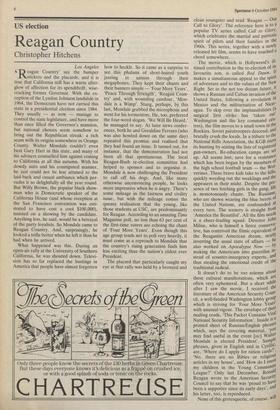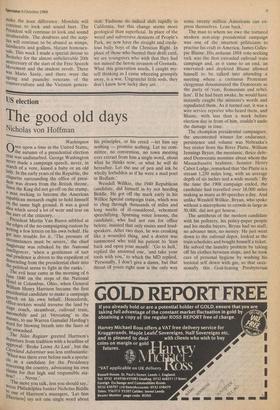US election
Reagan Country
Christopher Hitchens
Los Angeles 410 eagan Country' say the bumper
INstickers and the placards, and it is true that California still has a warm after- glow of affection for its spendthrift, wise- cracking former Governor. With the ex- ception of the Lyndon Johnson landslide in 1964, the Democrats have not carried this state in a presidential election since 1984. They usually — as now — manage to control the state legislature, and have more than once filled the Governor's mansion, but national choices seem somehow to bring out the Republican streak: a rich seam with its origins somewhere in Orange County. Walter Mondale couldn't even beat Gary Hart in this state, and many of his advisers counselled him against coming to California at all this autumn. With his dowdy suits and his constipated manner, he just could not be less attuned to the laid-back and casual ambiance which per- vades it so delightfully all the year round. But Willy Brown, the popular black show- man who is Democratic speaker of the California House (and whose reception at the San Francisco convention was esti- mated to have cost a cool $100,000), insisted on a showing by the candidate. Anything less, he said, would be a betrayal of the party loyalists. So Mondale came to Reagan Country. And, surprisingly, he looked a trifle better when he left it than he had when he arrived.
What happened was this. During an open-air rally at the University of Southern California, he was shouted down. Televi- sion has so far replaced the hustings in America that people have almost forgotten
how to heckle. So it came as a surprise to see this phalanx of short-haired youth jeering in unison through their megaphones. They kept their chants and their banners simple — 'Four More Years', 'Peace Through Strength', 'Reagan Coun- try' and, with wounding candour, 'Mon- dale is a Wimp'. Stung, perhaps, by this last, Mondale grabbed the microphone and went for his tormentors. He, too, preferred the four-word slogan. 'We Will Be Heard,' he managed to say. At later news confer- ences, both he and Geraldine Ferraro (who was also howled down on the same day) repeated this promise and realised that they had found an issue. It turned out, for instance, that the demonstration had not been all that spontaneous. The local Reagan-Bush re-election committee had helped to sponsor and to organise it. Mondale is now challenging the President to call off his dogs. And, like many otherwise unconvincing people, he looks more impressive when he is angry. There's some mileage in the fairness and civility issue, but with the mileage comes the queasy realisation that the young, like those students at USC, are predominantly for Reagan. According to an amazing Time Magazine poll, no less than 63 per cent of the first-time voters are echoing the chant of 'Four More Years'. Even though this age group tends not to poll very heavily, it must come as a reproach to Mondale that the country's rising generation finds him less exciting than the nation's oldest ever President.
The placard that particularly caught my eye at that rally was held by a bronzed and
clean youngster and read 'Reagan — Our Call to Glory'. The reference here is to a popular TV series called Call to Glory, which celebrates the martial and patriotic spirit of pilots and their families in the 1960s. This series, together with a newlY released hit film, seems to have touched a chord somewhere.
The movie, which is Hollywood's ill- timed contribution to the re-election of its favourite son, is called Red Dawn. It makes a simultaneous appeal to the spirit of adventure and to the values of the No Right. Set in the not too distant future, it shows a Russian and Cuban invasion of the United States, following a revolution in Mexico and the militarisation of Nicar- agua. To skip over the implausibilities (a, surgical first strike has 'taken out' Washington and the key command cen- tres), the film moves to a small town in the Rockies. Soviet paratroopers descend, and brutally crush the locals. In a tribute to the National Rifle Association, the KGB starts its hunting by seizing the lists of registered gun-owners. Re-education camps are set up. All seems lost, save for a resistance which has been begun by the members of the high school football team — the W°1- verines. These brave kids take to the hills, quickly weeding out the weaklings and the appeasers in their midst. Despite the Pre' sence of two fetching girls in the gang, life is monotonously chaste. The Russians, who are shown wearing the blue berets of the United Nations, are confounded at every turn. The scenery is straight from 'America the Beautiful'. All the film needs is a cheer-leading squad. Director John Milius, who is himself a fierce conserva- tive, has contrived the filmic equivalent of the Reaganite American dream, neatly inverting the usual state of affairs — he also worked on Apocalypse Now — bY making the Americans into guerrillas in' stead of counter-insurgency experts, and thus stealing the emotional credit of the traditional radical. It doesn't do to be too solemn about these cultural manifestations, which are often very ephemeral. But a short while after I saw the movie, I received the literature of the American Security Court' cil, a well-funded Washington lobby group which is striving for 'Four More Years with unusual vigour. The envelope of their mailing reads, 'This Packet Contains vital National Security Information'. Inside is 8 printed sheet of Russian/English phrases which, says the covering material, 'Yet' may find useful in the event [sic] Walter Mondale is elected President'. SamPle phrases, given in English and in Cyrillic, are, 'Where do I apply for ration cards?', 'No, there are no Bibles or religious articles in my house', and 'How do 1 enrol my children in the Young Commuoisl League?' Only last December, Ronalu Reagan wrote to the American SecuritY Council to say that he was 'proud to have, been a supporter since its early days', ano his letter, too, is reproduced.
None of this grotesquerie, of course, win
make the least difference. Mondale will continue to look and sound hurt. The President will continue to look and sound invulnerable. The doubters and the scep- tics will continue to be abused as wimps, fainthearts and godless, blatant homosex- uals. This week I made a special detour to Berkeley for the almost unbelievable 20th anniversary of the start of the Free Speech Movement and the student revolt. There Was Mario Savio, and there were the ageing and paunchy veterans of the counter-culture and the Vietnam genera-
tion. Fashions do indeed shift rapidly in California, but this change seems more geological than superficial. In place of the weird and subversive denizens of People's Park, we now have the straight and credu- lous bully boys of the Christian Right. In place of those who burned their draft card, we see youngsters who wish that they had not missed the heroic invasion of Grenada. What this generation needs, I caught my- self thinking as I came wheezing grumpily away, is a war. Ungrateful little sods, they don't know how lucky they are.















































 Previous page
Previous page